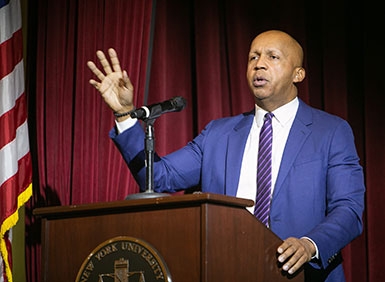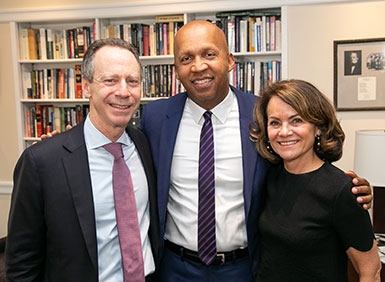Bryan Stevenson urges America to remember painful history in inaugural Aronson Lecture
“Tonight, I want to talk about memory and trauma and justice and what I believe it will take to get to a different place,” said Bryan Stevenson as he delivered the inaugural lecture of the Aronson Family Professorship on April 18. Stevenson, now Aronson Family Professor of Criminal Justice, holds a new chair established by Jeffrey Aronson ’83 and Shari Aronson, his wife.
Stevenson’s lecture, “Memory and Transitional Justice in America,” addressed the history of racism in the United States and what Stevenson identifies as a national failure to confront and remember the atrocities that have been committed against minorities.
“I don’t think slavery ended in 1865, I think it just evolved,” Stevenson said. “It turned into decades where black people were terrorized—pulled out of their homes, beaten, drowned, burned, shot, lynched. And that violence was something that the law looked away from.” In the United States, he said, a narrative of white supremacy continues to justify violence and subjugation.
In order to change that narrative and begin a process of recovery, Stevenson outlined four steps: understanding the current narratives, creating safe spaces for diversity, remaining hopeful, and being willing to do “uncomfortable things”—such as confronting prejudice and occupying inhospitable spaces—to oppose injustice.
Historical racism persists in present-day injustices such as the disproportionate incarceration rates for minorities, he said. He peppered in his own experiences, sharing childhood memories of scorn from white parents when he attempted to swim with their children in a hotel pool and his grandmother’s sorrow during their visit to the slave cabin where her father was born.
He asked the audience to embrace their roles in working toward a just society.
“There is a relationship I’m urging you to have with the history that we’ve forgotten,” Stevenson said. “There is a role I’m asking you to take when you have truth-taking action, when you create these spaces, when you stay hopeful, and you do uncomfortable things.”
Posted May 8, 2019



